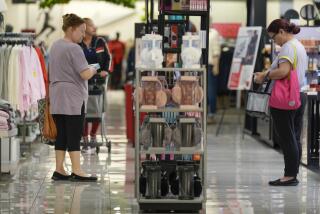Recession Over, Chief Economic Adviser Declares : * Economy: Administration aide Michael Boskin says a range of indicators shows that a turnaround has begun.
- Share via
WASHINGTON — The Bush Administration, through its chief economic adviser, on Thursday officially declared that the recession has ended and that the long-awaited economic recovery has begun.
Michael Boskin, chairman of the Council of Economic Advisers, told reporters at the White House that the latest economic data shows that a wide range of sectors is beginning an upturn.
“We do see over the last couple of months the first signals that the actual turnaround has begun,” Boskin said. “This certainly looks like a recovery has begun.”
Boskin’s declaration that the economy was improving came as a series of positive economic reports were released by the government.
Consumer spending, a critical engine for economic recovery, rose a healthy 1.1% in May, the Commerce Department said Thursday. At the same time, personal incomes rose 0.5% during May, the Commerce Department reported. And the Labor Department said the number of workers filing for unemployment benefits dipped in the second week in June, evidence that the nation’s jobs market was improving.
Earlier this month, Boskin had publicly said that he believed that the recession had “bottomed out” and that the economy seemed poised for a recovery. But Thursday’s statements put him clearly on record as declaring that a recovery is under way.
Boskin, although a presidential appointee, has developed considerable credibility by offering more candid comments on the state of the economy than did previous White House economists. In fact, Herbert Stein, President Richard Nixon’s chief economic adviser, lauded Boskin recently for his admission last winter that the recession had begun; Boskin did so earlier in the economic cycle, Stein said, than had any other Presidential economist during any previous recession.
But despite Boskin’s upbeat comments, sources stressed that senior Administration officials may still try to push the Federal Reserve Board to cut interest rates further to help accelerate the recovery. Treasury Secretary Nicholas F. Brady has frequently criticized Fed Chairman Alan Greenspan, arguing that he should lower interest rates at a faster pace.
The Administration will not try to persuade the Fed to cut rates next week, when the central bank’s key policy makers gather to review monetary policy, sources said, but may push for such action later this year if the economy doesn’t recover as rapidly as seems probable.
Bolstering Boskin’s assessment that a recovery has begun, other sources said a broad consensus is building on the Federal Open Market Committee, the panel that sets interest rate policy, that a recovery is under way and that further rate cuts are not needed.
Most senior Fed officials also believe inflation is under control, which they point to as evidence that the bank’s moderate monetary policies of the past year have been successful.
Boskin’s remarks were bolstered by the report that personal consumption increased to a seasonally adjusted annual rate of $3.81 trillion, up from $3.77 trillion in April. It more than wiped out a revised 0.4% decline the previous month.
At the same time, the report said personal incomes totaled $4.78 trillion, up from $4.76 trillion a month earlier. It was the fourth straight monthly advance and the steepest since a 0.6% gain last December.
In addition, the government had good news on the jobs front. For the week ending June 15, there were 431,000 Americans filing new claims for unemployment, a decrease of 17,000 from the previous week’s mark of 448,000, the Labor Department reported Thursday. The latest decrease puts jobless claims back on the downward trend that it was on for all of May before surging 47,000 in the first week of June.
Economists often study such initial jobless claims to get an early indication of the rate of growth or decline in employment. Greenspan has frequently cited such jobless claims as one of the most important statistics that he studies to forecast the economy’s direction.
Now, economists are widely predicting that the government will soon report that the gross national product--the nation’s output of goods and services--in the second quarter turned up for the first time since the third quarter of last year.
“We’ve seen increasingly, more and more items (of economic data) that had been declining moving from the negative column into the positive column, beginning to turn around,” Boskin said in his White House briefing. He said the latest data suggest that April marked the bottom of the slump in employment, while industrial production, another critical indicator, probably hit bottom in March and has since begun to rise.
Boskin added that inflation seems to be moderating even as the recovery is gaining steam, a sign that the economy is unlikely to dip back into recession later this year. Consumer prices have risen by 2.7% so far this year, and Boskin predicted that prices should remain relatively flat throughout 1991.
Personal income
Trillions of dollars, seasonally adjusted annual rate.
May, ‘91: 4.78
Source: U.S. Dept. of Commerce
Personal Spending
Trillions of dollars, seasonally adjusted annual rate.
May, ‘91: 3.81
Source: U.S. Dept. of Commerce
More to Read
Get the L.A. Times Politics newsletter
Deeply reported insights into legislation, politics and policy from Sacramento, Washington and beyond. In your inbox twice per week.
You may occasionally receive promotional content from the Los Angeles Times.










